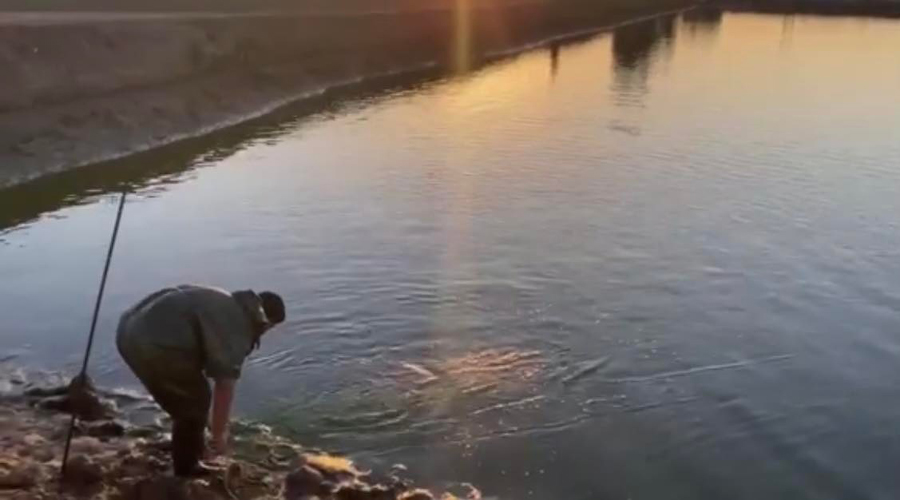The administration of Kirkuk is seeking to prevent the implementation of a decision by the Iraqi Ministry of Water Resources to demolish unlicensed water wells, which if implemented would harm hundreds of farmers whose livelihood depends on fish ponds.
Farmers of Daquq district, 44 km south of Kirkuk, gathered on Tuesday, January 11th, in front of the mayor office and demanded the annulment of the decision of the Ministry of Water Resources.
According to the decision, per which Daquq mayor was informed a few days ago regarding its implementation, all water wells for artificial fish lakes in the district will be demolished, noting that more than two thousand fish farming ponds depend on these wells.
Ramadan Majid, who owns a fish pond in Daquq, told KirkukNow, "We believe this decision will lead to the demise of the fish ponds in Daquq district. Iraq depends on our fish production, in addition to that, the owners of fish ponds provide job opportunities for tens of people, including guards, workers and drivers of transport vehicles, and we also feed the markets with Daquq fish.”
Video: farmers in front of Daquq mayor office, protest the decision by the ministry, asking chief of police to convey their unconsent to the mayor.
Ramadan said, "They should allow us to carry out our work. Fish farms are like oil for the people of Daquq. We demand the preservation of these basins by not demolishing these wells, the only source of supplying these basins with water."
In Daquq district, there are 2,226 fish farming ponds that depend entirely on groundwater that is extracted through wells.
The water of Daquq wells is characterized by its salinity, which, according to farmers, affects the taste and flavor of fish, boosting demand for it compared to fish farms in other regions.
A source in the groundwater department in Kirkuk anonymously said that the decision was made because the groundwater in the area has "decreased significantly."
"Daqouq is about to turn into a big lake due to the large number of fish ponds. This decision will certainly result in the demise of those ponds."
This decision comes at a time when the government has not presented any plans for farmers to continue to produce fisheries.
Ramadan was among the dozens who participated in the gathering in front of the mayor building in Daquq District.
Video: Wholesale traders and fish restaurants of Mosul confirm high demand on Daquq fish.
Imad Nemat, a farmer who owns a fish pond in Daquq, said, "we were told that they would demolish our wells. By implementing this decision, hundreds of fish ponds will be damaged, but they do not offer another solution. There is a water project in Daquq but it is available once in few days."
The establishment of the Daquq water project dates back to the period of the rule of the Baath regime, and it was established in order to deliver the waters of the Little Zab to Daquq agricultural lands.
But nowadays, with the decline in the water level of the Little Zab, a large number of farmers are turning to fish farms which require a big quantity of water continuously.
We demand the cancellation of the decision in order to preserve the fish wealth in Daquq
"We demand that the decision be rescinded so that the fish wealth in Daquq does not vanish," Nemat added.
Local officials said they will deliver the complaints of the fish farmers to the ministry in Baghdad.
Abbas Saber, the representative of the mayor of Daquq District, said, "The fish ponds were built illegally, and we received instructions to demolish water wells that were specifically built to supply fish ponds with water, as well as not allow equipment used to dig wells to pass through checkpoints, unless obtained permission from the governor and the Joint Operations Command."
About the alternative solutions that the government has for farmers, Abbas said, "During the protest rally, we contacted the governor of Kirkuk and informed him of the details of the problem. In turn, he asked them to address the Ministry of Water Resources to inform it of the farmers' problems in order to cancel that decision."





